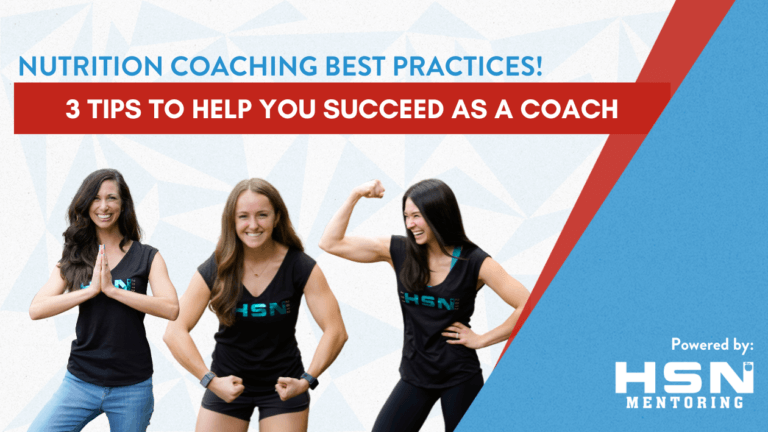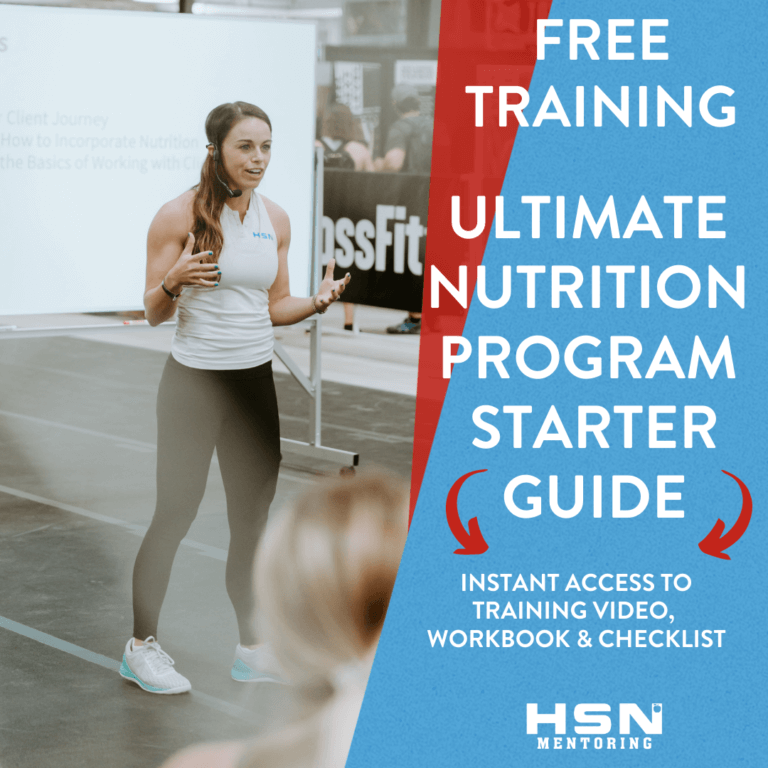Do you have a nutrition coaching practice and are looking to up your game? Or, are you an aspiring nutrition coach learning about the field?
Either way, we have your back!
At Healthy Steps Nutrition and HSN Mentoring, we provide an education base for nutrition coaches and gym owners that teaches the fundamentals for the business side of running a nutrition program as well as the nutrition coaching side.
Nutrition coaching is so much more than just offering meal plans and macro tracking. But, from our experience too many coaches place all their value in providing numbers to clients.
The number of macros clients should hit for their macro tracking, the number on the scale, the number of calories… Weekly check ins become a check list for hitting numbers rather than an actual coaching session.
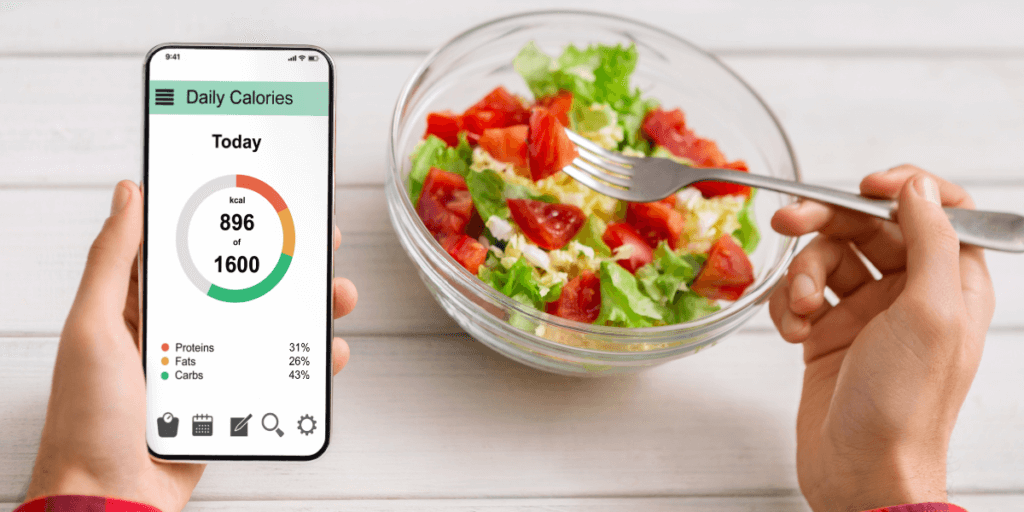
So much goes into the nutrition decisions our clients make. We believe that in addition to having nutrition knowledge, and understanding the basics of nutritional science, a successful nutrition coach needs to be trained to use a holistic approach in their coaching practice. It’s a fact that our nutrition clients need to build sustainable habits. It doesn’t matter if their nutrition goals direct them to want to gain muscle, focus on weight loss, or simply make better food choices.
Sustainable change happens with habit formation.
Our best coaches understand that they are more than a number counter for their clients. They feel confident in their ability to help clients understand that behavior change is where it’s at. Counting numbers is important during some phases of the nutrition coach/client relationship, however it’s not the only important aspect of coaching.
If you are a nutrition coach wanting to have the confidence to be more than a number counter, then continue reading!
In this blog post we will highlight some nutrition coaching best practices that will help coaches guide their clients to improve overall health, and gain true lifestyle change.
How Do We Define Nutrition Coaching?

Nutrition coaching is a personalized, and dynamic process in which a nutrition coach guides clients towards optimal health and wellness. Nutrition coaches provide individualized guidance, support, and accountability.
Clients learn why their eating habits are important through nutrition education. And by taking a client centered holistic approach, nutrition coaches facilitate collaborative discussions empowering clients to make informed choices, and decisions throughout their nutrition journey.
The Healthy Steps Nutrition Holistic Framework:
Stress Management
Having a positive mindset and helping clients determine how they best manage stress is vital to creating a healthy lifestyle.
Sleep
Sleep impacts recovery, mood, energy, food cravings, and metabolic health.
Support System
A client’s support system is vital to the client’s journey. Help the client identify who the positive influences are on their journey.
Lifestyle
Daily actions create healthy habits that lead the client to a healthy lifestyle and to become the healthiest version of themselves.
Exercise
Aim for clients to exercise at least 3-5x per week, and ask them about fitness goals.
Nutrition
Focus on whole foods first, limit the amount of added sugar and processed carbs.
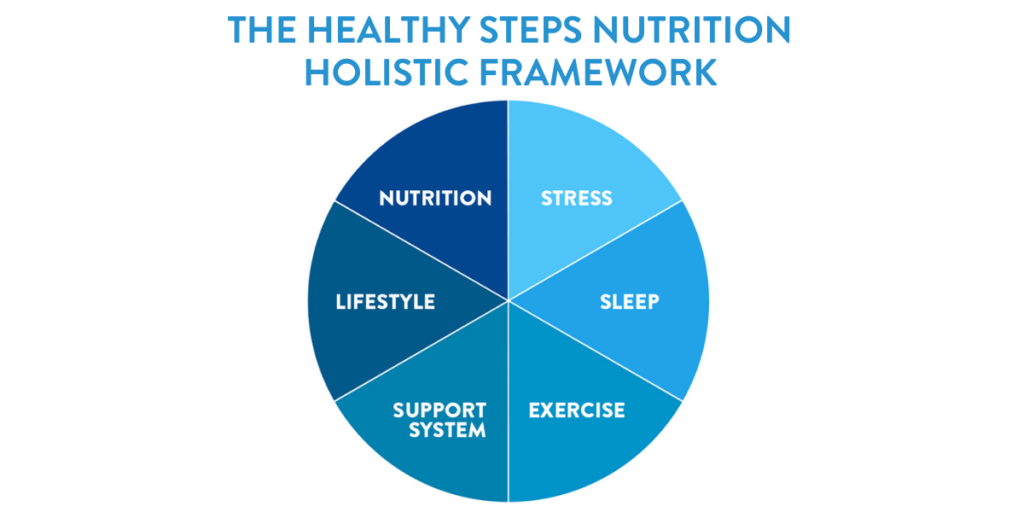
Many clients have poor eating habits and want to lose weight. When a nutrition coach trained using the HSN principles sees these health goals listed during a free consultation, they immediately begin asking deep questions. The purpose of these questions is to get to a clients true “why”. When the “why” is established, the “how” becomes much easier, and clients are much more successful in the long run. Success leads to motivation.
What Are The Best Nutrition Coaching Practices?
Our clients all start off with an initial consultation. This initial consult frames how the nutrition coaching relationship will move forward.

Tip #1 - Nail The Client Journey
Like we stated previously, nutrition coaching is more than just macros and a meal plan. During the initial consultation our coaches dig deep into the clients why. They explain the conversations moving forward will be about more than just food. We know that sleep, stress, support, lifestyle, and movement are all factors that play a part in reaching a health and wellness goal.
Our nutrition coaches establish the client journey so the client has a clear understanding of how long they may be in a relationship with their coach. This nutrition client journey looks different for every client, and depends on a clients health goals.
If a client has a weight loss goal, and needs to lose 30-50 pounds, the journey may be a little longer than someone who has a health and fitness goal with only a little bit of weight to lose.
The nutrition coach will then review a sample day of eating, review current routines, review c habits, and take biometrics. From this conversation, the nutrition coach will take notes and pull things that come to them as areas to work on.
From check in to check in our nutrition coaches follow a protocol of how each session will go.
They always practice CAPS!
C = Celebrate Bright Spots
A = Assess Progress
P = Plan Action Steps Using A Linear Path
S = State Confidence
This leads us to our second best practices tip.
Tip #2 - Keep A Client Centered Approach

When we talk about a client centered approach we are talking about making sure we are keeping the clients best interest at the forefront of our conversations, and leaving ourselves out of it. We are in service of our client, and it’s important to set those boundaries.
Nutrition coaches should practice self management and ask themselves these questions when considering how the conversations and checkins are going with their clients.
Is this providing value?
Is this helping my client get to their best thinking?
Is this benefiting my curiosity or is this benefiting my client?
It’s very common after seeing a nutrition client for several months for the relationship to develop and become “comfortable”. Often times this can lead to a lot of chit chat not related to the overall health goal. Although this can be fun, ultimately it doesn’t serve the client.
We suggest allowing for 3-5 minutes at the beginning of the bi weekly or weekly check ins to chit chat about the family members, and then move right into the task at hand, which is focusing on the clients goals.
Remember that our clients are self aware and capable beings!
A nutrition coaches goal is to get their clients to their best thinking. Coaches must encourage clients to think deeply by asking thought provoking questions. We want clients to come up with some of their own action steps based off of the answers to some of these thought provoking questions.
Our experience dictates that when we tell clients what to do, rather than allow them to reflect on what to do based off of their personality an prior experience, they are much less likely to succeed.
Here are some examples of thought provoking questions.
When a client asks you, “What would you do?” Your response as a nutrition coach should be something like this: “I have some thoughts around this, but I would love to hear from you first.”
If A client tries to implement everything they can think of at once to reach their goal: Your question should be: “Does the pace of your progress and your effort match the rest of your life and wellness goals?”
When a client answers a question you ask or makes a statement, instead of making assumptions about how your client feels about their answer, continue to dig deeper by asking: “Given everything that you just said, what is standing out for you right now?”
Putting the last example into play could look like this. Let’s say you asked your client how their meal prep action step went from their last check in. They answer by going on and on with reasons why they weren’t successful with it.
Asking the “given everything you just said” question prompts them to reflect on the real reasons why they weren’t successful, and helps them come up with scenarios that could work to be successful the next time.
Remember, silence is often a nutrition coaches best friend. Although, uncomfortable, it usually gets people to their best thinking.
A Nutrition Coaches Value
When nutrition coaches prompt clients to answer questions, and come up with their own action steps, they often wonder to themselves what value they are bringing to the client. Remember, that value as a coach doesn’t come from macros, meals plans, or always telling clients what to do.
Value comes from helping clients find clarity, and giving them a safe place to focus on their goal remembering that they will sometimes fail. Coaches are a safety net as clients are making a true lifestyle change. When clients get to their best thinking, coaches are going to be able to increase their clients confidence in creating these lifestyle changes through a proven habit based approach.
Tip #3 - Keep It Simple

As impressive as some coaches may think it is, seldom do nutrition clients keep attention during the entire nutrition science, and education piece of coaching. Keeping things simple is going to lend towards a higher rate of client success.
During these initial sessions we like to touch on:
The HSN Holistic Framework (see above)
3 HSN Core Principles which are:
whole foods first
a balanced plate (protein, carbs & fats)
limiting processed carbs and added sugar
We then touch on the “macros” and what they do for the body
From there we focus on ONE thing at a time. Here are some stats!
Focus on 1 thing – 80% retention one year later
Focus on 2 things – < 35% retention one year later
Focus on 3 things – < 5% retention one year later
Habit stacking throughout the week helps client make habits stick.
Here is an example of how the habit of adding non starchy veggies at dinner can be stacked.
Week 1: 1/2 Plate Non-Starchy Veggie at Dinner M-F
Week 2: 1/2 Plate Non-Starchy Veggies at Lunch and Dinner M-F
Week 3-4: 1/2 Plate Non-Starchy Veggies at Lunch and Dinner M-S
Coaches need to remember to meet the client where they are at, and be reasonable with expectations.
A fitness coach wouldn’t tell a sedentary person to go run three miles regardless of the fact they hadn’t run in years. They would educate the client on how to begin running safely allowing them to build the habit slowly working towards three miles.
The same holds true with nutrition coaching. For a client never eating veggies, adding 1/2 a plate may be too much. Adding a fist every other day might be a better alternative considering that pushing a ton of fiber to a belly that isn’t used to it could definitely cause some gastric discomfort.
Create A Clear And Confident Linear Path
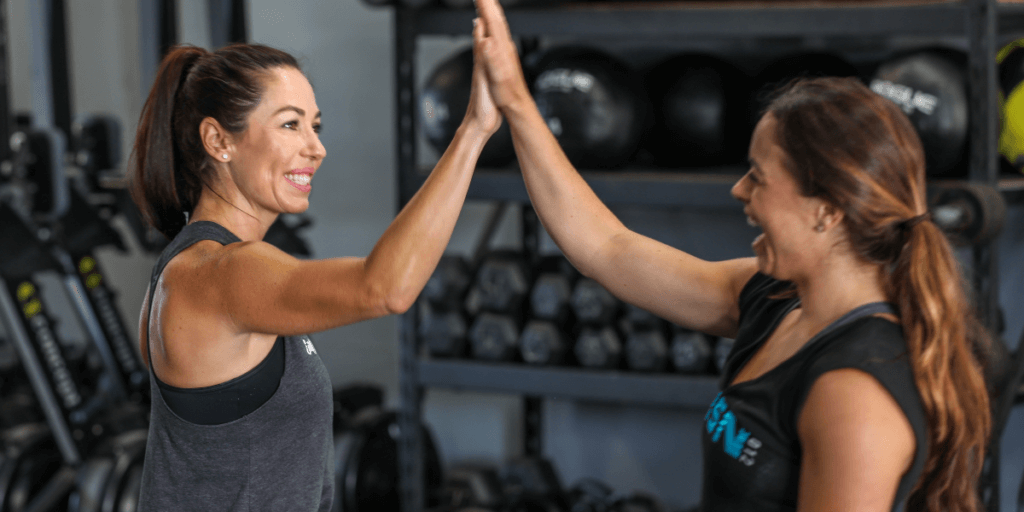
Achieving this means the nutrition coach has done an excellent job of making it clear to the client what and how to complete their actions steps.
Our objective with our meetings is to make sure clients are excited, and confident with their action steps. If they are, their likelihood of finding success is much higher than if they are not.
The best action steps and plan will:
Be chosen by the client
Be specific
Navigate barriers
Walked through step by step
Remember CAPS! Always have the clients state their confidence level in completing their action steps before they leave their session. Clients should be 80% confident in completing their action steps every time. If they are not, assess why. If necessary, an alternative action step should be chosen which the client is more confident in completing.
Wrap Up!
Success as a nutrition coach can be defined in so many ways. Most coaches define success strictly on client results. Although this is a great vanity metric, it’s so important to remember that even if a coach is putting forth their best effort, some clients just aren’t ready to make changes. This makes judging success only on client results not always the best metric.
Our thought is that coaches should define success on the effort put forth in these best practices. Nutrition coaching evaluations are a huge benefit to coaches. During these evaluations it can be determined how well a nutrition coach is sticking to these best practices.
If a nutrition coach is only seeing clients in person, asking clients permission to record the session from time to time for evaluation would be a good practice. If some sessions are remote, then reviewing recordings with the intent of self evaluation would be simple.
We would love to hear how these best practices are benefiting your nutrition coaching business. Send us a DM or email to let us know!

